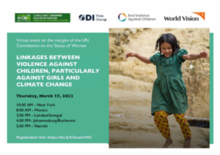It has been affirmed, “Climate change is one of the defining issues of our time”. Its impact across the planet and human lives has been widely acknowledged in light of the strong evidence around shifting weather patterns, rising sea levels and a number of climate-related phenomena. Moreover, climate change is a direct cause of different forms of violence against children, particularly girls and women.
For example, water scarcity due to drought and deforestation has forced girls and women to walk farther away from their villages. It is estimated that globally girls and women spend 200 million hours daily collecting water. The more time spent fetching water, less time spent at school and greater risk of being abducted, raped or even killed.
Loss of livelihoods due to heat waves, wildfires, floods, etc. exacerbates poverty, which can prompt early child marriage as shown by numerous studies in countries such as Malawi, Mozambique and others. At the same time these climate related phenomena increases domestic violence. Ultimately, climate change is further embedding gender inequalities as their social and economic life is seriously disrupted.
Whilst there is greater attention to the issue of climate change and violence against women and girls, when it comes to solutions, policy changes and investment there is lower attention the urgency of tackling violence against children, particularly against girls, including their participation in potential solutions that will impact their lives.
World Vision and the Overseas Development Initiative (ODI) have joined to explore critical linkages between climate change and violence against children agendas aimed at increasing attention to these critical issues. A working paper developed on “Ending Violence against children while addressing the global climate crisis” addresses this challenge and presents recommendations.

